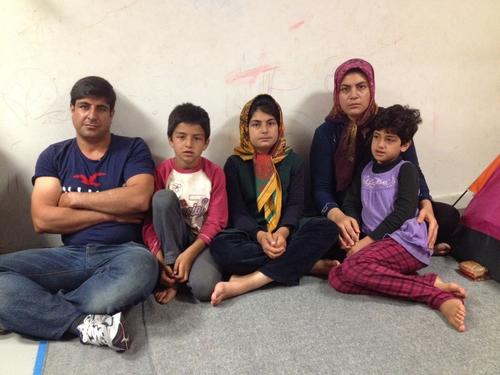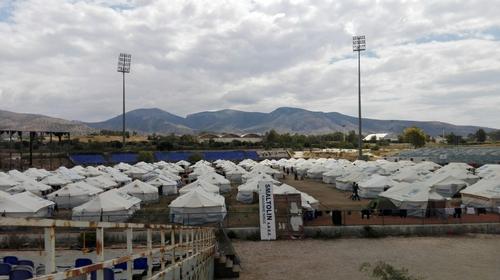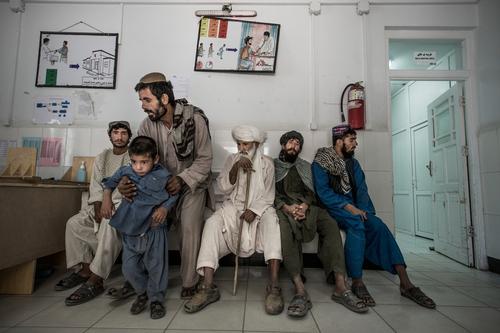Every morning, two vehicles belonging to Médecins Sans Frontières (MSF) draw up in front of one of the three stadiums that make up the sporting complex of Elliniko, in a suburb of the Greek capital, Athens. Built on a former airfield, the stadiums were put up for the 2004 Olympic Games. Now they house men, women and children who fled their countries in search of safety in Europe.
Most people here are from Afghanistan. They are civil engineers, teachers, tilers, truck drivers, reception clerks, coffwe shop owners, and students. Leaving behind conflict and violence, as well as all their possessions, most risked their lives to get here, walking across the snowy mountains of Pakistan, their children in their arms, hiding from police and armed men and eventually, after passing though Iran, crossing the sea between Turkey and Greece in unseaworthy rubber dinghies.
News spreads, a queue forms
For the past month an MSF medical team, including midwives, psychologists health promoters and cultural mediators, has been running mobile clinics in Elliniko, providing about 30 free consultations each day. The news has spread around the camp; people know when to expect the team and are already queuing when the vehicles arrive on site.
Walking amongst the tents set up inside the sports stadium, MSF cultural mediator Mohammad is called over by a woman. “I need help, please… I can’t stand this any more…” cries Fahima. Looking for a bit of privacy behind the closed doors of her small tent, and under the concerned eyes of her loving husband, Fahima tells her story.
‘The Taliban said they would kill us all’
“I was living in Kabul with my husband and our three children. My beloved father was working for an American oil company. One day, on his way from Kabul to Kandahar, he was stopped by the Taliban. They beheaded him. My husband was working for an international non-governmental organisation, and because of this we received a letter from the Taliban saying that we were no longer Muslims, and that they would kill us all. So we fled. I had to leave my mother behind because she is too old to travel. I feel so hopeless, I’ve become crazy; I’m violent towards my children, towards myself…” Mohammad arranges for Fahima to get support from MSF’s psychologist.

Fahima’s story is just one among many, and every day there is a queue of men, women and children waiting for a one-to-one consultation with the MSF psychologist. “We are seeing a lot of people with symptoms of anxiety and depression, mainly due to traumatic experiences,” says MSF medical coordinator Fouzia El Yaagoubi. “A lot of our patients were threatened and forced to flee; many were victims of physical violence or witnessed violence towards family members; some were victims of human trafficking or domestic violence.”
“The fact that people are living in very difficult conditions, in overcrowded sites, with no privacy and no decent sanitation facilities or food, is increasing their malaise,” says Fouzia. “The lack of consistent and credible information available also makes their life a nightmare, because they don’t know what will become of them.”
Giving birth in a tent
MSF midwives are also providing medical consultations specifically for women, most of whom have not seen a doctor for months. “Sexual and reproductive healthcare is highly needed,” says Fouzia. Almost four in five of our patients come for gynaecological consultations, the majority of them suffering from sexual infections. We are also seeing pregnant women, for whom the main fear is having to give birth in a tent.”





